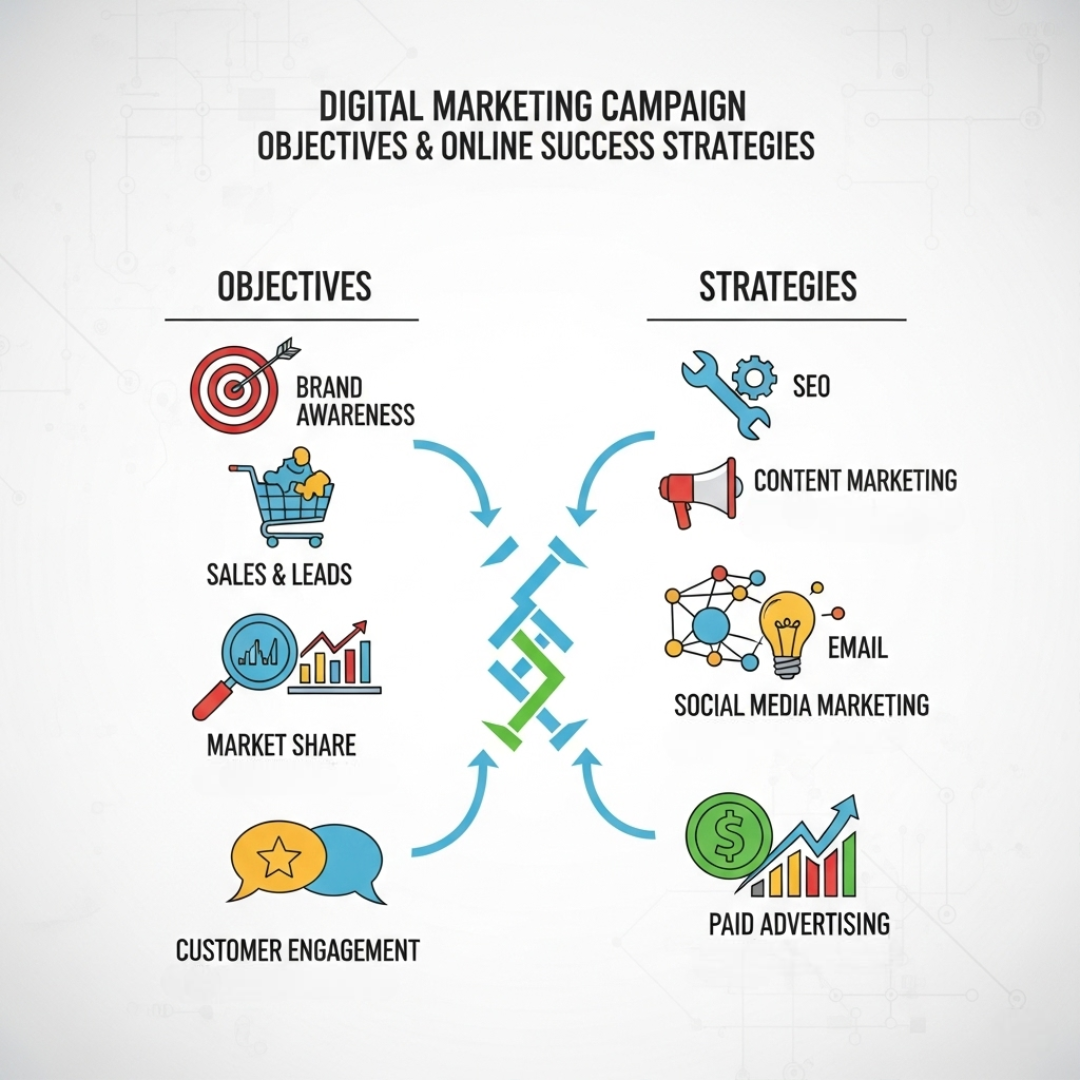In the fast-paced world of digital marketing, running a campaign without clear objectives is like sailing without a compass you might move forward, but you won’t know where you’re headed. If you’ve ever wondered what are marketing campaign objectives, they are the guiding principles that define the purpose, direction, and measurable outcomes of your online efforts. They help align your strategies, guide your budget allocation, and ensure every action moves you closer to your business goals.
In this guide, we’ll explore what marketing campaign objectives are, why they matter, and how to create strategies that deliver measurable online success.
Understanding Marketing Campaign Objectives
Marketing campaign objectives are specific, measurable goals that your campaign is designed to achieve. They form the foundation of your strategy and allow you to evaluate performance. In digital marketing, these objectives often revolve around areas such as brand awareness, lead generation, customer engagement, and conversions.
Some common examples of digital marketing campaign objectives include:
- Increase website traffic through SEO and paid ads
- Boost brand awareness via social media campaigns
- Generate high-quality leads using targeted landing pages
- Drive sales conversions through remarketing strategies
- Enhance customer retention with personalized email marketing
Why Objectives Matter in Digital Marketing
Without clear objectives, it’s impossible to know if your campaign is working. Setting well-defined goals provides:
- Direction – Your team knows exactly what to focus on.
- Performance Measurement – KPIs help track success over time.
- Better ROI – Resources are allocated to activities that produce measurable results.
- Strategic Consistency – Every marketing channel works toward the same goal.
How to Set Effective Marketing Campaign Objectives
The SMART framework is a popular method for defining objectives in digital marketing:
- Specific – Avoid vague goals like “get more followers.” Instead, aim for “gain 1,000 Instagram followers in 3 months.”
- Measurable – Use analytics tools to track progress (Google Analytics, social media insights).
- Achievable – Set realistic goals based on resources and current performance.
- Relevant – Align objectives with your overall business strategy.
- Time-bound – Set a clear deadline for achieving results.
Strategies for Achieving Online Success
Once you have your objectives, the next step is crafting strategies that will get you there. Here are some proven digital marketing strategies aligned with common objectives:
1. For Increasing Brand Awareness
- Leverage social media marketing with engaging content and influencer collaborations.
- Use display ads to reach a broader audience.
- Invest in search engine optimization (SEO) to appear in relevant search results.
2. For Driving Website Traffic
- Publish high-quality blog content targeting relevant keywords.
- Run Google Ads and social media ads with clear calls-to-action.
- Participate in guest posting and link-building strategies.
3. For Lead Generation
- Create lead magnets like eBooks, webinars, or free trials.
- Optimize landing pages for conversions with persuasive copy and design.
- Use email marketing funnels to nurture leads.
4. For Boosting Sales Conversions
- Implement retargeting ads for cart abandoners.
- Offer time-limited promotions and discounts.
- Use social proof like testimonials and case studies.
5. For Improving Customer Retention
- Personalize email campaigns with customer-specific offers.
- Launch loyalty or rewards programs.
- Use post-purchase follow-ups to encourage repeat sales.
Tracking and Measuring Success
A critical part of any digital marketing campaign is ongoing performance analysis. Use tools like Google Analytics, Facebook Ads Manager, and email marketing dashboards to track KPIs such as:
- Click-through rates (CTR)
- Conversion rates
- Cost per lead (CPL)
- Return on ad spend (ROAS)
Regular reporting helps you make data-driven adjustments to optimize results.
Final Thoughts
If you’re asking what are marketing campaign objectives, the answer is simple: they are the backbone of a successful digital marketing strategy. By setting clear, measurable goals and aligning them with the right online strategies, businesses can drive more traffic, generate quality leads, increase conversions, and build long-term customer relationships.
For expert guidance in creating campaigns that truly deliver results, Cardan Marketing Solutions can help you develop tailored objectives and winning strategies that ensure your brand thrives in the competitive digital landscape.

